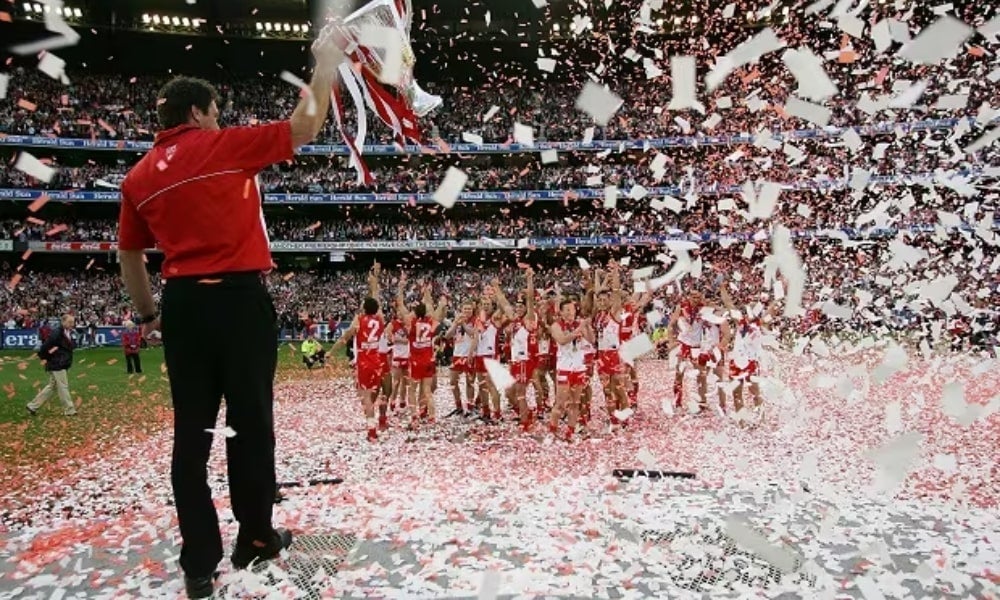How Myles Baron-Hay became the CEO of the Sydney Swans
Myles Baron-Hay reflects on his non-traditional career path that ultimately brought him to the Sydney Swans and how a Moneyball philosophy was key to the club's success
Once considered easy beats, the Sydney Swans have defied the odds to cement themselves as one of Australia's most successful AFL clubs. Their success was partly due to the significant changes in the club’s leadership in the early 2000s when Paul Roos took over as caretaker coach. In 2003, Myles Baron-Hay became the club’s CEO, and following a significant shift in the club’s core values and culture, the Swans won the 2005 premiership, breaking a 72-year drought.
What’s behind the Sydney Swans’ secret to success? According to the Swans' former CEO, Mr Baron-Hay, the Swans' success can partly be attributed to the club embracing the "moneyball philosophy". This sports strategy was popularised in baseball but has since been adopted in other sports and industries. It refers to a data-driven approach to decision-making that prioritises objective analysis over intuition.
Speaking at a recent AGSM Director’s Lunch hosted by Professor Nick Wailes, Senior Deputy Dean and Director AGSM @ UNSW Business School, Mr Baron-Hay discussed his career journey, from completing an MBA at the AGSM to becoming a CEO across various industries, including his tenure at the Sydney Swans.

From engineering to business
How did a Perth native with a background in engineering become the CEO of a Sydney AFL club? Reflecting on his career, Mr Baron-Hay emphasised that it had been anything but linear. “I never planned to work in three industries – construction, financial services and sports administration,” he said.
Hailing from Perth and as an engineering graduate from the University of Western Australia, Mr Baron-Hay said engineering was more of a stepping stone than his final destination. “Engineering, for me, is a great philosophy I draw on daily. It's all about problem-solving and creating a framework to solve problems. But having become a qualified engineer, I was looking for something more fulfilling,” he said.
“In school and university, I think I mastered the art of passing exams, which was a bit hollow. As I matured, I realised that as an engineer, I knew a lot about nothing. I knew a lot about steel and concrete, but there was more that I didn't know about the world.”
So, he embarked on a journey to complete an MBA at the AGSM in 1987 at 24. “After thorough research, I chose the AGSM, known for its top-notch ranking… the experience became transformative. I’m convinced the MBA was my best career decision. In my experience, you only get what you’re prepared to put in out of it,” he said.
Read more: Sydney FC’s Danny Townsend: kicking goals for the business of sport
The value of the MBA was enormous. “It rounded me out – gave me a breadth of understanding about things I knew nothing about. And it helped me build my local network.”
Expanding his network eventually landed him his first role and "lucky break" in fund management. “Having done the MBA, I thought, what will I do? I got a bit lucky. At a dinner party, I met someone in a senior position in financial services, and we got talking. Eventually, he offered me a job,” he said.
From fund management to the Sydney Swans
Over the next six years, from 1989 to 1995, Myles worked for a fund manager in New Zealand. Throughout this time, however, he said he was being “tapped on the shoulder” by his father, who wanted him to look after the family’s construction business in Perth. He said: “The family had a 50 per cent interest in a commercial construction company… but I never wanted to go there as the boss's son. I wanted to go there with something to offer. So, I resisted going there for the longest time.”
Eventually, however, he yielded and in 1996 moved to Perth to become the company’s CEO. “Our biggest challenges and opportunities were in the Sydney market. So, we relocated to Sydney and went about the job. While I was well qualified, I struggled to get passionate about the construction industry. It just wasn’t me. And after three years, I came out of the closet, a hard thing to do, and fessed up and told dad that it was his dream and not mine and that it's not going to be me longer term,” he said.

So, he sold the family business in 1998. Returning to the funds management and financial services industry, Myles worked across several roles, landing at BT until Westpac acquired it in 2002, which saw some significant internal changes. “I was again looking for an opportunity outside the business. I didn't know exactly what I was looking for, but I had a criteria, which defined the elements of the right job for me,” he said.
His criteria were based on knowing what makes him tick, what motivates him, and what he is passionate about. “I think the test is: you have got to look forward to Mondays. If you don't look forward to Mondays, you probably haven't found your passion,” he said.
“And once again, I got lucky. I re-connected with Richard Colless. who was the Chairman of the Sydney Swans at the time. It's a small world because Richard was a director on the board of trustees I reported to as a funds management CEO in New Zealand. “We had met each other in the corporate world. I came from Perth, I loved AFL, played AFL not very well and went through the hoops at the Swans with the rest of the board, and eventually came out the other end. They offered me the job.
“It ticked all the boxes and the criteria I had in selecting the right job. Working at the Swans was always a privilege and honour and one of my favourite jobs.”
Read more: Sports analytics: why your favourite team knows more about you than you think
The ‘Moneyball philosophy’: strategic decision-making in business and sports
In 2003, the team narrowly missed making the Grand Final. With a new coach, a new leadership team, and a motivated playing group, the Sydney Swans developed a bold plan to win the premiership – a significant feat for a club that hadn’t won one in 70 years. Embracing the Moneyball philosophy from the Oakland Athletics, they set about creating multiple sources of competitive advantage with limited resources.
Mr Baron-Hay explained: “It was all about the people for me. Sporting clubs are the ultimate people business, and it was the people that underpinned the Swans’ success. It was a lot about leadership, the culture and values. They weren’t just words on a piece of paper. We lived them. They became what we stood for – they defined us. Our values affected our behaviour and how we conducted ourselves on and off the field and in the community. They influenced our decision-making.”
He said that companies often commit to writing their values on a piece of paper and then go about breaching them every day without consequences. “But when you mobilise everyone and align everyone to a plan underpinned by those values, it becomes very powerful, and anything is possible.
“And one of the great philosophies we embraced at the Swans was the Moneyball concept, a story about Billy Beane, and the Oakland Athletics. Michael Lewis wrote a book, and a movie has been made featuring Brad Pitt and others. But it was essentially how you create sources of competitive advantage with not much money. And that's essentially what we did.”

So, they invested in leadership on and off the field, emphasising shared responsibility through co-leaders and house captains. Everyone was expected to lead, he said.
“We weren't financially wealthy relative to the big clubs – we didn’t have what they had. But we went about creating competitive advantages around people: leadership, culture, values, and those sources of competitive advantage that money can't buy and are very hard to replicate. So they didn’t have what we had either and that underpinned our success,” explained Mr Baron-Hay.
The team invested in statistical analysis and neural systems were used to predict draft outcomes and optimise player selection. A partnership with a European soccer team helped anticipate and manage injuries, ensuring a healthy player roster. These strategic elements contributed to the team's success. and the 2005 premiership was the crowning glory.
“I am delighted that the foundations set under Paul Roos and the leadership group appear to be in place today. Succession planning – handing the baton from one generation to the next – be it the captains, the coach, the CEO, the Chairman – has been managed extremely well at the Club. It has provided real stability and consistency despite the week-to-week nature of sport.”
Subscribe to BusinessThink for the latest research, analysis and insights from UNSW Business School
Balancing career and personal life
In 2009 and after seven seasons at the Swans, Myles decided it was time to make his young family his priority. He wanted to be a present father.
He explained: “I always saw my role at the Swans was like sprinting a leg of the relay. To sprint for as long as you could and then to hand the baton on to the next person. Anything less than a sprint meant the competition was otherwise leap-frogging you. I think the same is true in the corporate world.
“It’s not about the length of your tenure but more about what you do and achieve in your time. And ultimately, what you leave behind. I did eventually find that elusive balance in life”.
